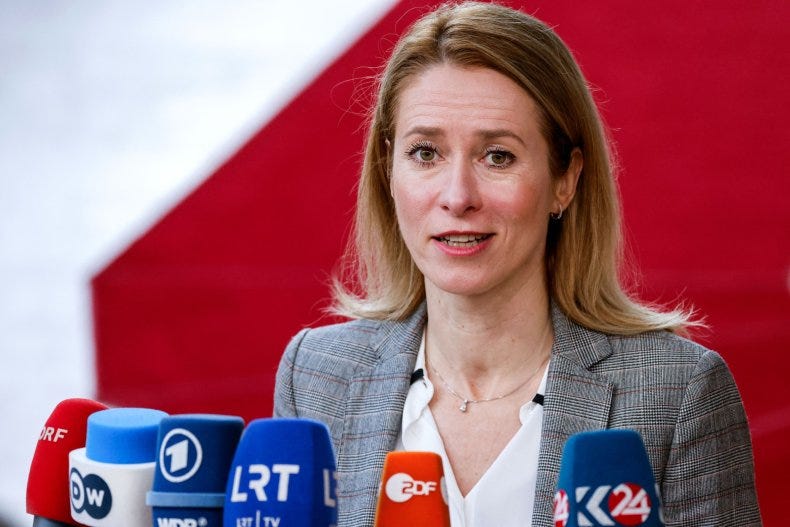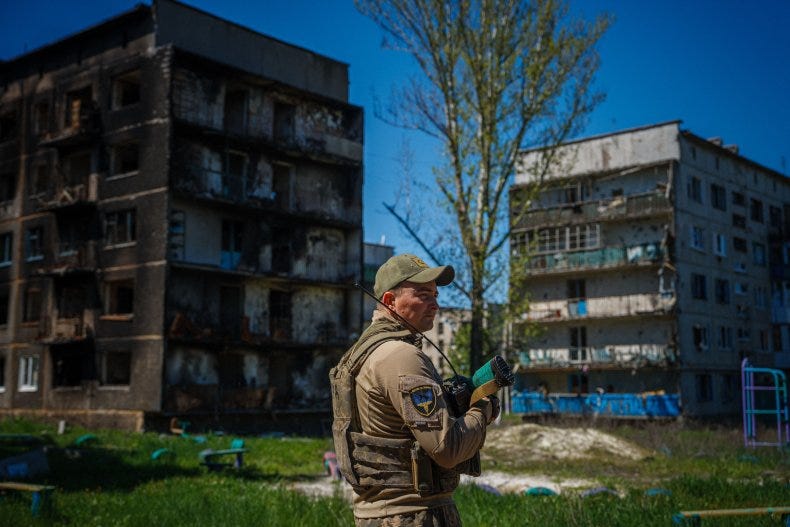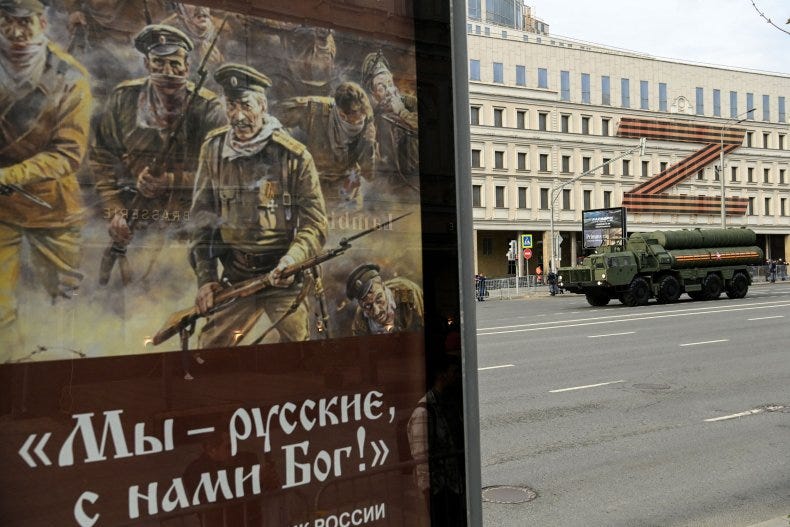May 16: David Brennan, Russians 'Haven't Changed' Since World War II: Estonian Prime Minister
Article as published in Newsweek on May 12, 2023
Russians 'Haven't Changed' Since World War II: Estonian Prime Minister
By David Brennan, Newsweek on May 12, 2023
Russian forces fighting in Ukraine are exhibiting the same "brutality" as the Soviet troops that occupied much of eastern and central Europe during the Second World War, Estonian Prime Minister Kaja Kallas said.
While Ukraine's Western partners analyze Russian capabilities on display through more than one year of full-scale war, Kallas said European Union and NATO nations must also end what she called the "historical cycle" of Russian aggression against its neighbors.
"I'm very surprised that they haven't changed since the Second World War," Kallas told Newsweek in an exclusive interview at Stenbock House, the official seat of the Estonian government—in Tallinn.
"The way they operate, the brutality, the atrocities; it hasn't changed at all. And the question that I have in my mind is, how is that possible, really, in 2022 or 2023? But it is still so."

Estonia, which shares a 183-mile border with Russia, has long been among those nations sounding the alarm over the threat from Moscow. Tallinn and its Baltic neighbors emerged from hundreds of years of Russian—and later Nazi German and Soviet—rule, punctuated by brief periods of independence. For them, Ukraine's struggle echoes their own.
Moscow's clear defeat and subsequent war crimes trials for its leaders, Kallas said, are imperative for all those along Russian borders.
"We are carefully gathering lessons: how they act, how they fight, and how they operate, generally, to be prepared," she explained. "There's a much broader question that is outside the military scope, and this is the question of how to really cut this historical cycle that Russia always continuously attacks its neighboring countries. And the key to this is accountability.
"There hasn't been any accountability for the crimes that Russians have committed in their neighboring countries. Whereas for the Germans, there were the Nuremberg Trials. And the Nazi crimes are widely condemned across the world.
"One of the outcomes of the Nuremberg Trials, for example, was that the German people got to know about the crimes that the Germans committed, and hence they have this public guilt about this. The Russians don't have that."
Ukraine is now working with foreign partners to set up a special tribunal to try Russian President Vladimir Putin and his top officials—likely all in absentia—for their aggression against Ukraine. How such a tribunal will be formed, operated or be given international legitimacy remains to be seen.
"The special international tribunal to prosecute the crimes of aggression is of utmost importance," Kallas said. "Crimes of aggression are leadership crimes. Somebody decides to attack another country. And if there isn't any leadership crime—the crime of aggression—there are no war crimes, either.
"Russia has seen that nothing happens when they attack another country. All the aggressors, or would-be aggressors, in the world are carefully taking notes. If the outcome of aggression as a policy tool is that you walk away with more territories than you had before, that aggression pays off. And it's a call for everybody to use that."
'They Can't Win'
Western hopes of a mass uprising or palace coup to unseat Putin have not come to fruition. Infighting among Moscow's elites may undermine Putin's leadership, but there is little indication that he is losing his grip on power.
"We see those signs, but we would want to see those signs much stronger. They definitely have some infighting going on," Kallas said, noting the recent public protests of Wagner Group boss Yevgeny Prigozhin against rivals in the regular Russian military hierarchy.
Polls—ever questionable given the risks of speaking out in against an increasingly totalitarian state—surveying Russian attitudes to the war paint a picture flitting between enthusiasm for and indifference toward the Kremlin's so-called "special military operation," which began with the invasion of Ukraine on February 24, 2022.
"The majority of Russian people support the war," Kallas said, citing recent polls.
Among the top reasons, she said, is the "glory" respondents associate with such a conflict.
"Coming from a small country where war always means destruction and human suffering, for a bigger country it might mean 'glory.' And that's the worrying part," she said.
Any hope of negotiations and compromise, Kallas suggested, is misplaced.
"The war ends when Russia realizes it was a mistake, like they did with the [Cold War-era] war in Afghanistan.

"When they realize that they can't win this war, then they'll stop. And that's why it's very important that we are behind Ukraine saying that we are ready to go on as long as you, we are supporting Ukraine as long as it takes. And it's also important for Russians to see that the will of the Ukrainians is not breakable."
With the Kremlin's forces struggling on the battlefields of Ukraine, Western minds are turning to what comes next for Russia, and how extreme a makeover will be required before any level of cooperation—or even tolerance—can be revived. Officials and policy wonks have been debating the merits of goals ranging from regime change to demilitarization, and even dismemberment.
All give more ammunition to Russian officials and Moscow propagandists seeking to whip up popular support for a war they frame as existential.
"The goal for the West is that Russia is pushed back to their territory and the war ends, because the war ends then," Kallas said. "What happens to Russia, how they manage themselves; I think it shouldn't be the worry of the West, really. It's not up to us to say. It is the processes inside Russia that would happen then.
"It's a big territory, a lot of small nations, different types. If they want to have an independent country, it's up to them to decide. But I don't think it's for the West to say, really, what happens inside Russia."
The Nuclear Option
Bloody attrition warfare is ongoing in multiple frontline hotspots in southern and eastern Ukraine as Kyiv prepares what it hopes will be a significant spring counteroffensive. Russia still occupies some 20 percent of Ukrainian territory, and leaders in Kyiv have made clear their intention to liberate all and cede none.
Ukrainian ambitions to retake the Crimea—occupied and annexed by Moscow in 2014 following the pro-Western Maidan Revolution—is causing particular concern among Kyiv's Western allies. Their fear is that Putin might resort to nuclear weapons to prevent the loss of the peninsula, which holds great strategic and symbolic value.
"It's up to the Ukrainians to say," Kallas said when asked where Kyiv should stop its advance. "I don't think from outside we can say where we think the line is. It's up to Ukrainians to say where they draw the line, really, and what they are willing to give up.
"Even if, politically, somebody decides that to have some kind of peace agreement, I don't think that the Ukrainian people will agree to this. I mean the fighters, it's very hard to see.
"I'm worried about the policy tool of aggression paying off. If you move to another country, attack that country, and then you walk off with more than you had before, then it's only upside.

"You don't really calculate your people when you're a dictator. You don't really care about the people. But you have more fertile soil, industry and whatever is there. You walk away with more, and then it is a bad sign for the whole rules-based international order."
Putin's nuclear arsenal remains his trump card, though NATO nations are believed to have quietly outlined to the Kremlin the Western retaliation that would follow the use of even a small, tactical nuclear warhead in Ukraine.
Kallas said those who have the most to fear are the least concerned.
"If the Russians decide to use a nuclear bomb, it would be on Ukraine or some other neighboring countries," she said. "It wouldn't be on those Western countries. So, if Ukraine is not afraid, if we are not afraid, you shouldn't be, either, because you are not the ones that will be hit."
Newsweek has reached out to the Russian Foreign Ministry by email for comment.



